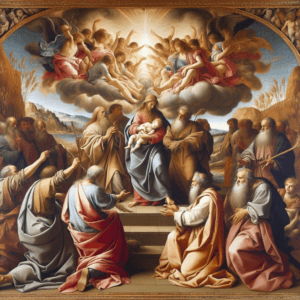ISHMAEL’S INHERITANCE
God holds to the promise that He has made. As a sign of keeping this covenant, God had a new requirement for Abraham. He and every male of his household, born or bought, and every male in every generation to come, must be circumcised.
This is the ritual removal of the foreskin. Those who were not circumcised would not be included in this covenant between God and Abraham’s people.
That’s already a lot of change for one meeting, but God is not done yet. He truly surprises Abraham, telling him that Sarai’s name must also be changed. She will now be known as Sarah, and she and Abraham would have a son after all.
In reverence, or gratitude, or pure surprise, or perhaps all three, Abraham falls facedown and laughs. He’s shocked at the mere suggestion of Sarah conceiving and bearing a child.
Then Abraham has another thought: What about Ishmael? God has already given a promise of blessing on Ishmael, spoken to his mother Hagar (Genesis 16:10–12).
Here, though God will again promise to bless Ishmael abundantly, the covenant promises between God and Abraham will not pass through Ishmael.
Instead, they will pass to Isaac, Abraham’s yet-to-be conceived son with Sarah. That son will have been born by this time the following year.
With that, God concludes His revelations and “leaves,” at least symbolically giving Abraham an opportunity to make a decision. Abraham’s head must have been spinning, but he did not hesitate to begin to obey God.
That very day, he went home and circumcised himself, Ishmael, and the hundreds of other males in his large company. Abraham’s immediate obedience is further evidence that he was choosing to trust the Lord and to take Him at His word.
Genesis 17:20-27 KJV
[20] And as for Ishmael, I have heard thee: Behold, I have blessed him, and will make him fruitful, and will multiply him exceedingly; twelve princes shall he beget, and I will make him a great nation.
[21] But my covenant will I establish with Isaac, which Sarah shall bear unto thee at this set time in the next year.
[22] And he left off talking with him, and God went up from Abraham.
[23] And Abraham took Ishmael his son, and all that were born in his house, and all that were bought with his money, every male among the men of Abraham’s house; and circumcised the flesh of their foreskin in the selfsame day, as God had said unto him.
[24] And Abraham was ninety years old and nine, when he was circumcised in the flesh of his foreskin.
[25] And Ishmael his son was thirteen years old, when he was circumcised in the flesh of his foreskin.
[26] In the selfsame day was Abraham circumcised, and Ishmael his son.
[27] And all the men of his house, born in the house, and bought with money of the stranger, were circumcised with him.
Genesis 17:20
And as for Ishmael, I have heard thee: Behold, I have blessed him, and will make him fruitful, and will multiply him exceedingly; twelve princes shall he beget, and I will make him a great nation.
 The Lord would bless Ishmael, but not as it regards the Covenant. The blessing here pronounced was not because of Ishmael, but because of Abraham, and Abraham alone.
The Lord would bless Ishmael, but not as it regards the Covenant. The blessing here pronounced was not because of Ishmael, but because of Abraham, and Abraham alone.
This verse is God’s “yes” to Abraham’s apparently anguished request. Abraham desires that his son Ishmael might live under God’s blessing. Abraham may have meant he wanted Ishmael to be the son of God’s covenant promise.
This certainly seems to be what he expected. God made clear in the previous verse that was not to be; Isaac would receive that blessing.
However, God acknowledges that He has heard Abraham’s request for Ishmael, whose name means “God hears.” God repeats what had been promised to Hagar (Genesis 16:10–12), that Ishmael’s offspring would be numerous.
God adds that Ishmael will father 12 princes and become a great nation. Ishmael, then, is to be greatly blessed, though in merely human terms.
His offspring, divided into 12 princes, will become a great nation, but they will not become the covenant people of God. Isaac’s offspring, also destined to be divided into 12 tribes, will become God’s own nation.
Genesis 17:21
But my covenant will I establish with Isaac, which Sarah shall bear unto thee at this set time in the next year.
 So now they know when the child will be born. Here, God concludes His revelations to the newly renamed Abraham for this encounter.
So now they know when the child will be born. Here, God concludes His revelations to the newly renamed Abraham for this encounter.
Unlike earlier visits from God with their grand unconditional promises and few details, God’s words to Abraham, now 99 years old, have been overwhelmingly specific.
In addition to changing Abraham’s name, God has commanded Abraham to walk before him and to be blameless. He has commanded Abraham to circumcise himself and all the males in his household.
God has also changed Sarai’s name to Sarah, revealing that she will bear a son and that son will be the one to whom God’s covenant promises will pass. Ishmael, now 13, will be greatly blessed, but his will not be the covenant people of God.
Finally, in this verse, God reveals for the first time a timeline for his promises. By this time next year, a boy named Isaac will be born to Abraham and Sarah.
One can only imagine how much Abraham’s head must have been spinning.
Genesis 17:22
And he left off talking with him, and God went up from Abraham.
 Communion with the Lord is the most profitable exercise there is. God’s relatively lengthy encounter with Abraham ends here. For the first time, we’re told about God’s departure from one of these meetings. He “went up” from Abraham.
Communion with the Lord is the most profitable exercise there is. God’s relatively lengthy encounter with Abraham ends here. For the first time, we’re told about God’s departure from one of these meetings. He “went up” from Abraham.
Perhaps this detail is included to emphasize that God’s appearance to Abraham really happened. It wasn’t something Abraham imagined. God came. God spoke. God left.
The words here suggest the idea of Abraham being left with a choice: will he believe, trust, and obey?
Again on his own, Abraham must believe and act on what God had said. He does so in the following verses.
This willingness to follow God’s instructions, and to do so immediately, is a key aspect of Abraham’s character. This is the attitude which leads to Abraham being a model of godly faith: trusting obedience in the face of doubt (Romans 4:3).
That compliance will be severely tested later on, when God gives an unimaginably difficult to command to Abraham (Genesis 22:2). The end result of that event is one of the Bible’s greatest examples of faith (Hebrews 11:17–19).
Genesis 17:23
And Abraham took Ishmael his son, and all that were born in his house, and all that were bought with his money, every male among the men of Abraham’s house; and circumcised the flesh of their foreskin in the selfsame day, as God had said unto him.
 The obedience of Abraham in circumcising the entirety of his house, servants and all, should be a lesson to us. Abraham immediately demonstrates his faith in the God who appeared to him by obeying God’s command.
The obedience of Abraham in circumcising the entirety of his house, servants and all, should be a lesson to us. Abraham immediately demonstrates his faith in the God who appeared to him by obeying God’s command.
Abraham kept his part of the covenant God had initiated by circumcising himself and every male in his extensive household. He did so on the very day God appeared to him, starting with Ishmael, his 13-year-old son.
Circumcision was not unheard of in that era, but this does not change the magnitude of Abraham’s immediate obedience. Circumcision involves removing the foreskin from the penis, which is painful and, one would assume, awkward.
We’re not told anything of the reaction to Abraham’s requirement for all the men and boys under his care. Abraham overcame whatever resistance may have presented itself to obey the command of the Lord.
It’s worth noting that those who would have resisted this command entirely had an option, of sorts: to be “cut off,” or separated, from the family of Abraham (Genesis 17:14).
Genesis 17:24
And Abraham was ninety years old and nine, when he was circumcised in the flesh of his foreskin.
 Circumcision is the badge of the covenant which God has made with Abraham. Someone will ask, “Why was Ishmael included?”
Circumcision is the badge of the covenant which God has made with Abraham. Someone will ask, “Why was Ishmael included?”
Hasn’t God promised that Ishmael is going to be a great nation also?
He is included in it in that sense, but he is not the one whom God had promised to Abraham at the beginning. He is not to be the father of the nation that God will use and the nation through which the Messiah will come.
This verse repeats again that Abraham was 99 years old on the day God appeared to him and he was circumcised. Perhaps he was the oldest man ever to be circumcised, at least at that time.
God’s plan for future generations of Abraham’s offspring was to use this ritual as a sign of the covenant with God, to be performed when they were eight days old (Genesis 17:12).
Circumcision is removing the foreskin from the penis. This symbolically represents many aspects of our relationship to God. It requires setting aside, or removing, a naturally-born part, just as our sinful desires need to be set aside in favor of following God.
The area affected is more or less circular, which is a common symbol of eternity and constancy; this covenant was meant to be a permanent practice by Israel. It also represents the eternal and unchanging nature of God.
Likewise, this ritual affects the organ of reproduction, signifying the passing of truth from generation to generation. In fact, circumcision creates a ring around the point through which passes the man’s contribution to reproduction.
Circumcision is not required for believers in Christ, even though it is still part of God’s unchanging covenant with the nation of Israel.
In fact, in the New Testament era, the term “circumcision” will become shorthand for those who think their good deeds can earn them salvation (Galatians 5:1–6).
Genesis 17:25
And Ishmael his son was thirteen years old, when he was circumcised in the flesh of his foreskin.
 Even though Ishmael was circumcised, he who was born after the flesh was by his natural birth a rebel, even though he may enter in an outward covenant.
Even though Ishmael was circumcised, he who was born after the flesh was by his natural birth a rebel, even though he may enter in an outward covenant.
Ishmael, 13, was also circumcised on this momentous day in the life of Abraham and his household. God had made clear to Abraham that Ishmael, though he would be greatly blessed, would not be the child through whom the covenant promises would pass.
Still, as a male living in Abraham’s household, Ishmael must be circumcised along with all the other men and boys. God’s prior instructions were very specific: those who were not circumcised could not be a part of the promised people (Genesis 17:14).
Genesis 17:26
In the selfsame day was Abraham circumcised, and Ishmael his son.
 Two men were circumcised; by that rite both men entered the Covenant; however, only one of the men, Abraham, was saved.
Two men were circumcised; by that rite both men entered the Covenant; however, only one of the men, Abraham, was saved.
This verse repeats once more that this day of circumcision of all the males in Abraham’s extensive household was the very same day that God appeared to Abraham and told him to do so.
Abraham demonstrated his faith in God and his eagerness to keep the covenant with God by obeying the command immediately. This willingness to obey God, in trusting faith, is a hallmark of ancient patriarchs such as Abraham (Romans 4:3) and Noah (Genesis 6:22).
In fact, Abraham’s trust in God will make him a prime example of faith used in the New Testament (Hebrews 11:17–19).
While circumcision was practiced in other cultures for various reasons, this particular meaning was specific to Israel. And, it almost certainly caused a stir within Abraham’s family.
Even so, Abraham’s immediate obedience is a recurring point in this chapter—so he clearly wasted no time or argument on obeying God.
Genesis 17:27
And all the men of his house, born in the house, and bought with money of the stranger, were circumcised with him.
 This one Passage tells us that every single man in the house of Abraham was saved, whether servants, slaves, or family, that is, if they believed.
This one Passage tells us that every single man in the house of Abraham was saved, whether servants, slaves, or family, that is, if they believed.
The Epistles to the Romans, to the Galatians, and to the Colossians teach that Christians are circumcised in the Cross of Christ, baptized into the Death of Christ, and raised in the Resurrection of Christ, all of which circumcision was a Type.
This final verse of Genesis 17 repeats once more, for emphasis, that Abraham obeyed God’s command completely.
Every single male in his household, including those born in the household and those purchased as slaves, was circumcised right along with Abraham and Ishmael on the very day God had given that instruction.
We’re not told what Abraham felt about all God had revealed to him, but Abraham’s full and unhesitating obedience reveals his full faith in the Lord.
One reason for this repeated emphasis might be the very nature of the command: to circumcise every male, which meant cutting off the foreskin of the penis. The natural reaction one might expect, at least from most men, is a desire to wait.
“Hang on, let’s think about this first.”. Instead, Abraham’s pointed obedience to God the very same day demonstrates how seriously he took his relationship with God.
How many men were in Abraham’s household? We can’t know for sure, but it likely included hundreds or more. Abraham was extremely wealthy.
Years earlier, when Lot had been captured by foreign invaders, Abraham was able to raise an army of 318 trained men “born in his household” to go on the rescue mission.
We must imagine that the household consisted of many more men at that time, and even more born and acquired since then.
That makes for a significant number of circumcisions in a single day with very little warning to all those men. Abraham exercised his authority and overcame whatever resistance or objections may have been raised in order to fully obey the Lord.
I hope that you have really enjoyed this post,
Please Leave All Comments in the Comment Box Below ↓













And he said to them, “Go into all the world and proclaim the gospel to the whole creation. Whoever believes and is baptized will be saved, but whoever does not believe will be condemned. Mark 16:15-16
Fitting verse to describe this site. Be bold and spread the word without fear. Very well laid out and direct. It will capture the attention of any viewer. Good job with the layout of the message as well as the site.
Michael
Hello Michael,
Thank you for commenting on Ishmael’s Inheritance – Because Of Abraham.
Blessings My Friend!
My husband and I were discussing the circumcision of covenant Israel not long ago.
I like some of the symbolism you mentioned here, like round representing eternity or cutting off the natural part of us that keeps us from the Lord. We were also considering the idea that as circumcision in ancient times aided in cleanliness, it was an outward manifestation of the discomfort or even pain that is required to remain clean before God, to stay virtuous.
Abraham was certainly an example of instant obedience and willingness to obey!
Hello Jessica,
Thank you so much for your interest in HBS & DwJ.
In the Holy Bible, there are so many symbolisms, however, praying before studying a scripture works best for me in receiving Revelation from it.
Your comment is very much appreciated. Please feel free to continue commenting on other episodes on this platform.
Many Blessings My Friend!
Man, Abraham’s obedience game was on another level!
I mean, God drops the bomb about circumcision for everyone in the household, and Abraham just goes for it without batting an eye.
That kind of trust and quick action makes me wonder if I’m that ready to follow through on my own faith journey, you know?
Have a good day.
Hello Jake,
Thank you for taking the time to stop by and comment on another HBS & DwJ episode.
There are a number of us who think we are ready for certain things in life until we are face to face with them. What we do next is the real us according to our actions and not just our thoughts.
You have a good day as well,
Blessings My Friend!
This is a very detailed explanation of the covenant between God and Abraham about circumcision.
I learned alot from reading this post, and had no idea that circumcision started because of the covenant. And it is amazing that Abraham was circumcised at the age of 99 years old.
It also explains why boys are circumcised when they are babies, as young as 8 days old.
Is circumcision done by only certain denominations of churches?
Or only certain religions?
Thank you.
Hello LineCowley,
Thank you for your continued additions of value to this website and these podcast episodes.
Abraham was not the first person on earth to practice circumcision, but the way God implements this ritual is unique. The symbolism of this act relates to crucial aspects of Jewish and Christian theology.
The foreskin is a natural-born part of the person, but needs to be deliberately shed (under circumcision) in order for the people of Israel to honor God. This is symbolic of the need to set aside sin and other in-born urges in favor of God’s will.
The removal involves a circular shape: circles are frequently used as symbols of permanence and eternity, and this covenant is said to be everlasting. Also, the means of human reproduction, male sperm, would literally pass “through” this circle, symbolizing the influence of God on the very existence of His people.
Hope this helps,
Blessings My Friend!
It is a fascinating read on the covenant between God and Abraham.
The aspect of Ishmael’s inheritance and the circumcision ritual really stands out. It’s intriguing to see how this act symbolizes spiritual commitment within a complex family narrative.
I’m particularly drawn to the nuanced distinction between Ishmael’s blessing and Isaac’s role in the covenant. It raises a compelling question:
How might this differentiation have influenced the respective paths of their descendants, both historically and spiritually?
The interplay of faith, obedience, and divine intent in this narrative seems to have far-reaching implications across generations.
Hello Sonia,
Welcome to the HBS & DwJ platform.
Historically, Jews and Christians trace their lineage to Isaac and Muslims trace their lineage to Ishmael.
Spiritually, with Ishmael and Isaac, God chose one. Again with Esau and Jacob, God chose one. This is a pointer to GOD’s final choice, Jesus Christ, the offspring.
Thank you for stopping by, please feel free to stop by anytime.
Blessings My Friend!